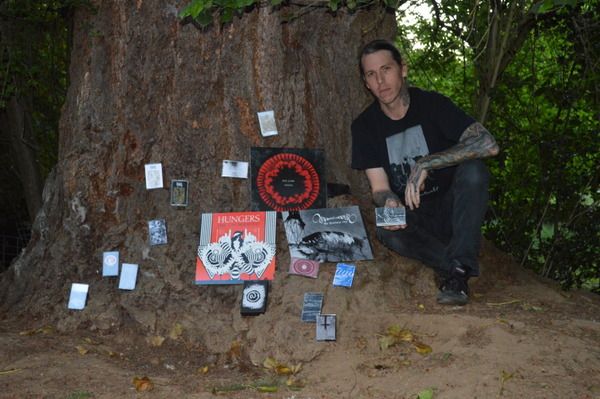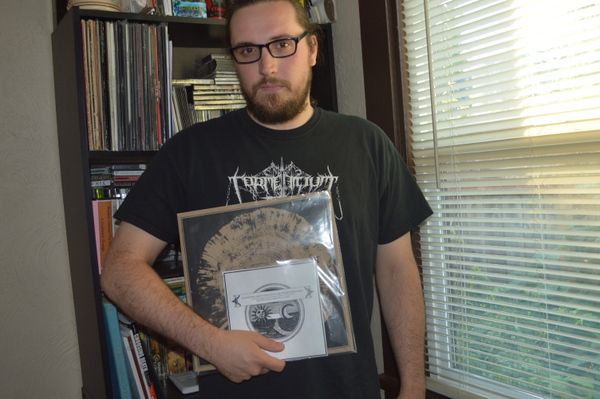Home > News
08/26/2015
Snap, Crackle, Pop: Two Eugene labels explore the appeal of vinyl and tape
BY VANESSA SALVIA // Belief Mower label and Glossolalia Records staunch in their indie ways
Whatever “the future of music” was dreamed to be when compact discs first took the stage, we’re a far cry from that now. We may be in the digital age, but labels across the country, and in particular two located in Eugene, are focusing on music on vinyl and tape. The trend toward analog formats is even more apparent for fans of extreme metal.
Abe Hurd, a musician in Eugene with a label called Belief Mower, put out a CD by his own band at the time, Rye Wolves, and two CDs by another of his bands, VHMNT (pronounced “vehement”). “I pretty much vowed to never do that again because I find much more pleasure in tape and vinyl than I do in CDs,” says Hurd.
Hurd got the idea to form a label when his first band, Rye Wolves, was lured to a so-called legit underground label in 2007. “They proceeded to utterly screw us,” he says. The label even claims to have lost the vinyl master, so there’s nothing in existence of that band’s first recording efforts.
Hurd decided that rather than trust in the “illusion of safety” of a record label, his band should put their stuff out themselves. They self-released the second Rye Wolves album, Species Battle in the Branches. “Before I even had the epiphany of a label we made 100 CDs.”
Now Belief Mower has 21 titles in its catalog. A black metal tape by an artist known as Krieg sold out quickly, which encouraged Hurd to try to put out other music. He’s the first label to put out music by Muscle and Marrow, a dark, heavy Portland-based band. “A few releases were for personal friends,” Hurd says. “Others were for people who approached me that I respected. I like to help out people who are doing art because they have to and they’re not compromising their integrity. I believe in people who do that. It’s what makes art beautiful and what makes it worth getting behind.”
So far, Belief Mower has put out three albums, one for Seattle’s Eye of Nix, a heavy doom band with classically trained, operatic vocals, one for Portland sludgy doom band Hungers, and The Human Cry by Portland’s Muscle and Marrow. Tapes are what most of his customers are drawn to.
“Tapes are a total calling,” says Hurd. “People who listen to tapes listen to tapes, and particularly with black metal, there’s something about the way it sounds on tape, the way it adds this rawness.”
In today’s interconnected world, people can discover anything and everything with just a few keystrokes. It’s easy for people to find the music or art that speaks to them, but they can’t find it if it’s not there. That’s partly what motivates Hurd—it’s certainly not for the money.
When Belief Mower has been in the black, that money went right back into making other recordings or promoting bands with concerts.
“I don’t make a cent, I just barely break even,” says Hurd, who, at 42, grew up in the age of music before CDs. “I value that form of listening because it reminds me of growing up and listening to tapes and records. I wanted people that are into the music that I like to be able to find these other things because they’re like-minded folk,” he explains. “Putting out more esoteric, eccentric forms of underground art like I do can be risky, because you’re really catering to people with attention spans for that type of music, which is not right for everyone. My label is very eclectic. I’ve put out music that ranges from beautiful, harrowing, moving acoustic music to fully blackened drone and doom, and pretty much everything in between, and I’m super proud of that.”
Kenneth Parker is 27 and decided to start his label, Glossolalia Records, in 2011 after he’d been playing music for a couple of years.
At that time he’d broken up after a long-term relationship and wanted an enterprise, something “to pour himself into.”
“I had met more and more people who had projects and were trading tapes and CDRs but with no real audience,” Parker says. “I had no real idea that I could be the platform for these people. I just wanted to put out music for my friends’ bands that I knew were local and for whatever reason themselves didn’t really know where to start to do DIY production.”
Initially, Parker chose to release CDs, because of convenience and affordability. He also wasn’t planning on releasing his own music through Glossolalia, but that changed. “It’s much easier when you’re running your own thing to release your own music because you can do it immediately or on your own time schedule, whenever you want to,” he says.
As of now, Glossolalia has 49 physical releases but, counting digital, the total jumps to more than 100. Two items never materialized, so his physical catalog actually has 47 items in it. Parker’s first release was a Pro CDR in a DVD case of “really intense raw black metal” for a project called Terra Deep that’s sold out. He also released the first album by Cult of Unholy Shadows, which has artwork done by another Eugene metal figure, graphic designer Sean Schock. “From the very beginning I was conscious that I could keep it as localized as possible,” says Parker, “not so I could proudly say ‘Pacific Northwest only,’ but because I thought it would be easier to use the skills of people I knew, and then it snowballed.”
Last year, Glossolalia released their first 12-inch for Parker’s project called Grst (pronounced ‘grist’). A split 7-inch with a limited edition of 60 for four bands—GX Jupitter-Larsen, Johnathan Cash, Enrique Hernandez/The Strangulation of C. Olson—was released in February.
“One of my goals was to do at least one vinyl release in each size,” says Parker. “I had a 10-inch on my list, but that never happened.” Parker plays, along with his brother Stephen, who plays guitar, in a technical death metal band called Arkhum. That band just finished a song in anticipation of a new album they’re going to be shopping around soon. He also plays in a blackened doom band called Maestus, also with Stephen, and a variety of random noise projects, primarily one called Willowbrook.
Parker started releasing tapes for convenience, primarily because he had many other musicians friends with their own distribution labels, and it’s easier to trade a tape for a tape. Lately, he’s been duplicating his own tapes for the label. “I don’t have an actual tape duplicator, so it’s tedious, but it means that the tapes come out sounding really nice,” he says. “Every tape is like a master.”
The appeal of tape and vinyl is equally strong with Glossolalia’s clientele. “I think initially people just liked the idea of tapes being kind of cool,” he says. “It’s like the signpost of a serious band to do a tape now, which is funny because even just 10 years ago I’m not sure that would have been the case. And I think there’s good reasons to be interested in vinyl, because with vinyl there’s still a warmth and a depth there that you don’t get from digital files.”
People want analog formats at this point in time, whether it’s for extreme metal or the corner bar jazz band. Parker says it was some of his CD releases that took the longest to sell.
Like Belief Mower, Glossolalia isn’t exactly what Parker would call a profitable enterprise. “I’ve been in the black before but I’m not interested and never have been in making it anything more than a part-time arrangement,” he says. “And whenever I get a chunk of change from it, I roll it into the next project, so I don’t really ever see it.”
Even if it doesn’t make money, it definitely became something to pour himself into. Now though, it’s time to take a slight step back. Parker is starting classes at the University of Oregon in the fall, with the goal of becoming a professor of English. The label’s online store will remain open, but there may not be any new music for a while.









